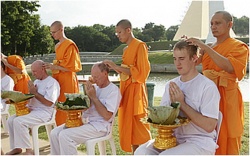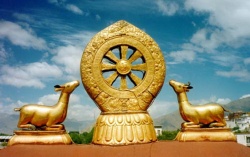Brief Notes on Dedication of Merits
The dedication of merit as it is taught in the Buddhadharma is one of the most vital and profound part of spiritual practice and a unique aspect of the Buddha’s teachings not found in other forms of spirituality. The reason why we are still suffering in samsara is that we have not gathered the accumulations of merit and wisdom. Although we have performed numerous positive deeds over many lifetimes but we have never dedicated this merit to the achievement of full enlightenment for all sentient beings. Thus when the positive karma ripens, it simply leads to some temporary positive states or happiness which will be used up in time and therefore when our merit finishes, we will lose that happiness and simply fall back into suffering.
By dedicating our merits to supreme awakening for all beings, even though we will experience positive results and well-being from that merit, but it will not be used up until the ultimate aim of your dedication, which is supreme enlightenment for all beings, is achieved. Thus, dedicating our merit is like adding a drop of water to an ocean, just as the ocean never dries up, that drop of water is never exhausted. The ocean is likened to the vastness of the purpose to which our merit (a drop of water) is directed to.
Another reason why we dedicate our merits is because in the teachings it is said that ‘a hundred eons of generosity and moral discipline can be destroyed in one moment of anger’.
We could also spoil our merits through the following ways:
1. Boasting of our positive deeds out of pride
2. Regretting, eg, regretting a donation not only destroys your virtue but may also lead to negative imprints of stinginess leading to karmic results like rebirths as hungry ghosts, poverty etc.
Therefore, dedicating merits prevents it from being spoilt and destroyed. It is important to dedicate merits in a timely manner, ie. after one has performed the positive deed, one should try to remember to dedicate the merits immediately as negative emotions or other conditions that lead to spoilage of merit can arise at any time.
Furthermore, if we dedicate our merits, the merits increases everyday. Just as negative karma increases everyday, dedicated merits increases everyday so that the fruition of the virtue can be vastly greater than the initial merit. For example, the Sutra of Twenty-Five Thousand Stanzas says that there is more virtue and more power in dedicating a small or insignificant virtuous action to full awakening than there is if you sponsor this entire world filled with Arhats and Pratyekabuddhas for their entire lives and do not dedicate your merit.
How to dedicate merits?
If we dedicate our merits thinking that there is an inherently existing “I” , inherently existing “merit” and inherently existing “sentient beings” then it becomes a ‘contaminated dedication’. A ‘contaminated dedication’ can only lead to states of well-being in the mundane samsaric realms of gods or humans. It cannot lead to perfect enlightenment. As ordinary sentient beings are trapped in their delusion of not being able to understand the true nature of reality, it is not possible for them to be immediately free from these concepts, therefore while on the path of practising, in their dedications, they must first skilfully make reference to the perfect dedication of Buddhas and Bodhisattvas who have realised emptiness and the truth of reality.
To dedicate merits, the steps are:
1. Call upon all Buddhas and Bodhisattvas of the ten directions to witness your dedication.
(My own opinion: If you wish to verbalise this request, you can say “Buddhas and Bodhisattvas of the three times and ten directions, please pay heed to me!” If not, you can merely visualise or mentally feel this happening. The reason why we need not worry that Buddhas are unaware of our dedication is that the Buddhas are omniscient and all sentient beings minds are fundamentally not separate from the Buddhas’ minds. So for the Buddhas, there is really no distance or time to obscure their knowingness. For us, it is merely to remind ourselves that we are asking the Buddhas to witness our dedication of merits, firstly to engender our own confidence, secondly, as a form of respect and as they are really our objects of refuge, thirdly, it increases the strength of our dedication and purifies it of any conceptualisation or stain)
2. Supplicate them to cause this dedication to be free of the threefold conceptualisation (mentioned above)
3. Think, “I dedicate this virtue in the same manner of dedication of all the Buddhas and Bodhisattvas of the three times (past, present and future). May my virtue be dedicated like theirs. May my virtue become like theirs.”
4. Remind oneself that the person dedicating, the merit dedicated, and the sentient beings one dedicates to is like a dream, an illusion, not having true inherent existence.
In the Sutra of the Vajra Peak on Dedication and other sutras as well, the five steps of dedication are elucidated:
1. Summon all the merit created by yourself, all sentient beings and the noble beings (like the Buddhas and Bodhisattvas, Arhats and Pratyekabuddhas) and dedicate this virtue as a cloud of offerings to all Buddhas.
2. Dedicate it to the flourishing of the Buddha’s teachings in this world
3. Dedicate to the longevity and expanded activity of the upholders of the teaching
4. Dedicate to the happiness and prosperity of the world
5. Dedicate to the achievement of perfect enlightenment by all beings
Each of these five aspects of dedication transforms a tiny virtue into a huge one. Then one can summon all of that virtue again and dedicate it to the principal object of dedication who might be some benefactor, or deceased person.
At this point, ordinary sentient beings can only dedicate merit by emulating the Buddhas and Bodhisattvas through making reference to them, coupled with a reminder of the non-conceptual unconditioned nature of reality free of the three spheres of concepts (ie, the inherent existence of dedicator of merit, merit and objects of dedication). However, when one truly realises emptiness directly as the first bhumi Bodhisattvas do, then at that instant, all of your previous conceptual and defiled accumulation of merit is transformed into an undefiled nonconceptual accumulation of wisdom.
The importance of rejoicing
Prior to dedication of merit, in the seven branch prayer, there is the part on rejoicing. By rejoicing in the merits of others, one creates great merits that could be equal to the merits of others, depending on one’s level of realisation. Therefore it is important to rejoice in the positive virtues created by all sentient beings and enlightened beings in the three times and ten directions before making a dedication. This skilful means can allow one to accumulate great merits easily with only a small effort.
Repeated dedication
Some people ask why it is possible to dedicate past merits. It should be reiterated here that merit can be dedicated many times and each time you dedicate the merits, one increases the merits automatically as the act of dedication is in itself an act of creating merit.
A brief, easy yet thorough way of dedication for the beginning dharma practitioner:
Join the palms at one’s heart, think that all the Buddhas and Bodhisattvas are paying attention to you, then say, “By all the merit accumulated (by all beings) in the past, may all sentient beings attain Buddhahood. May this merit be dedicated in the same manner as all the Buddhas and Bodhisattvas dedicated.”
(Note: The part in brackets “by all beings” need only be understood in one’s mind, and it is not necessary to say it aloud each time.)
A more thorough method of dedication
One can recite the Samantabhadra King of Prayers (available in Tibetan and English in another post) and other such relevant prayers. The blessings that dedication prayers have corresponds to the realisation of its author. Therefore, one of the best prayer for dedication is the Samantabhadra King of Prayers which is part of the Avatamsaka Sutra, taught by the Buddha Shakyamuni himself.
If one does not have the time, then one can at minimum, recite the eight verses that Lord Nagarjuna had said encompassed the entire meaning of the Samantabhadra King of Prayers. They are as follows:
JAM PAL PA WO JI TAR KHYEN PA DANG
With the same wisdom of courageous Manjushri and
KUN TU ZANG PO DE YANG DE ZHIN TE
similarly, like (the aspirations of) Samantabhadra,
DE DAG KUN GYI JE SU DAG LOB CHIR
following them entirely in their manner of (dedicating merits),
GE WA DI DAG THAM CHAD RAB TU NGO
in the same way I dedicate all these merits completely.
DU SUM SHEG PAY GYAL WA THAM CHAD KYI
All the Sugatas, Victorious Ones of the three times
NGO WA GANG LA CHOG TU NGAG PA DE
have praised this dedication as supreme, thus
DAG GI GE WAY TSA WA DI KUN KYANG
all my roots of virtue
ZANG PO CHOD CHIR RAB TU NGO WAR GYI
are completely dedicated to excellent conduct
For the pure-land practitioners
For those who aspire to be reborn in the pure-land of Amitabha (Dewachen), it is also important to make dedication prayers for this purpose. Although this is already included in comprehensive prayers like the Samantabhadra King of Prayers, but if one does not recite that due to lack of time, then one should also make specific dedications to take rebirth in Dewachen immediately after this life without any obstacles.
What to dedicate
All forms of virtue no matter how small and insignificant should be dedicated. It can be feeding a bird a drop of food, it can be simply even a smile, dropping a few cents in a beggar’s bowl, a positive thought, a heart that rejoices when you see other’s good fortune. Merit is accumulated when one has a single instant of compassion, love and kindness for others. All the actions driven by love, compassion and wisdom that undermines delusion and self-grasping creates merits. Anything that benefits sentient beings creates merit, so even eating can create merit if you have the motivation of offering food to the sentient beings in your body as it all depends on the mind.
Thinking of impermanence for an instant creates merits, thinking of emptiness or even entertaining that notion for one second accumulates vast merits. Seeing the image of Buddha and admiring it or praising it accumulates merit…the list is simply endless… if one understands the dharma and has devotion and kindness, there are countless ways in daily life to create merit. Even if one does not have the time to always be so mindful and dedicating, then at the end of the day, one can do just one major dedication, recalling all those moments of positive states of minds and actions during the day and then dedicate these merits in the proper manner.
Special Objects of Dedication
One can dedicate merits to one’s teachers, parents, children, ancestors, country, government, boss, benefactors, sponsors, karmic creditors, those whom one has particularly harmed or eaten the flesh of, etc. All these dedications should be done after the main dedication for all sentient beings have been done (as stated above). It is important to dedicate for our parents and karmic creditors (in my opinion) as they have been of great kindness to us in giving us the chance to practise the dharma. Karmic creditors are people we have harmed before and owe a karmic debt now. Through our practice, such debts can slowly be resolved and it is important to make such dedications with sincerity.
It is also possible to make dedications for those who are suffering whether in the human or other realms of existence, whether from sickness, famine, drought, natural disasters, psychological etc. The point of dharma practice is to benefit others and if one dedicates merit to these suffering beings, it is one way to benefit them in both the temporal and ultimate way. We should dedicate for them to leave their states of suffering and also for them to find the ultimate liberation and perfect enlightenment of Buddhahood. This solves their problem both on the temporary and permanent basis.
Ways to Augment Dedication of Merits
The following Buddha names and mantras can be recited after dedication prayers to increase the merits:
CHOM DAN DAY DE ZHIN SHEG PA DRA CHOM PA YANG DAG PAR DZOG PAY SANG GYE NAM PAR NANG DZE OD KYI GYAL PO LA CHAG TSHAL LO
JANG CHUB SEM PA SEM PA CHEN PO KUN TU ZANG PO LA CHAG TSHAL LO
OM DHU-RU DHU-RU JA-YA MU-KHE SOHA (7X)
OM RU-RU DHA-RU MU-KHE MU-KHE SOHA (7X)
OM HA-NU-BHA-SHA BHA-RA HRI-DA-YA SO-HA (7X)
The following Buddha name and prayers when recited can seal dedications and prayers and make them come true:
NAMO RAT-NA TRA-YA-YA TAD- YA-THA PEN-TSA DRI-YA A-WA BO-DHA NA-YE SOHA
CHOM DAN DAY DE ZHIN SHEG PA DRA CHOM PA YANG DAG PAR DZOG PAY SANG GYE MEN GYI LA BE DUR YA’I OD KYI GYAL PO LA CHAG TSHAL LO
CHOM DAN DAY DE ZHIN SHEG PA DRA CHOM PA YANG DAG PAR DZOG PAY SANG GYE NGO WA DANG MON LAM THAM CHE RAB TU DU PAY GYAL PO LA CHAG TSHAL LO
SANG GYE KU SUM NYE PAY JIN LAB DANG
CHO NYI MI GYUR DEN PAY JIN LAB DANG
GEN DUN MI CHE DU PAY JIN LAB KYI
JI TAR NGO SHIN MON LAM DRUB PAR SHOG
By the blessings of the three kayas attained by Buddha,
by the blessing of truth of unchanging dharmata,
by the blessings of the irreversible intent and aspirations of the sangha,
may these dedications and aspirations be accomplished.
(You can choose which names or mantras to recite. There is no fixed rule.)
Auxiliary Note:
If you have close connection to a realised Guru and if you have done a very large merit, for instance, reciting a million of certain mantras or prayers, released the lives of many animals, offered thousands of lamps, etc. Then it is possible to request this omniscient master to do a dedication for you too. Due to their realisations, bodhichitta, aspirations and inconceivable qualities, the effect will be greatly augmented. One can also offer the merit to one’s own most kind Guru as a offering of practice. This will further enhance and make one’s practice even more meaningful.






